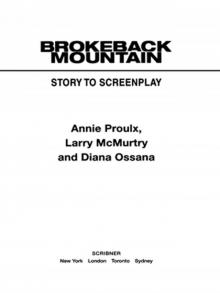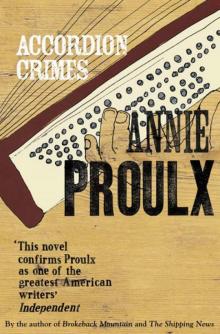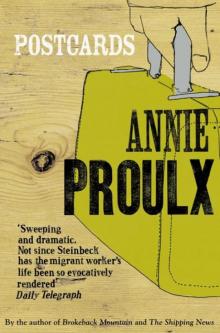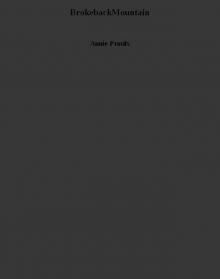- Home
- Annie Proulx
Barkskins Page 7
Barkskins Read online
Page 7
In the third week of his journey Duquet awoke and opened his left eye, the right stuck shut with hardened pus. In his exhaustion he fell often to the ground and lay with his face against the leaf litter. He was beyond the pain of his abscessed jaw; swathed in veils of mosquitoes he sucked in raw air with its taste of decaying wood. On his hands and arms were five or six suppurating wounds. He had found rib bones with strings of dark meat clinging to them under a serviceberry bush, but when he put one to his mouth something wild came at him, tearing with teeth and claws. It ran with the prize. He was weak from the loss of blood, not only from the biting animal, but from blackflies, from mosquitoes. Then he lost the river. He tried every direction, but it had disappeared. For an entire day he scooped at the dirt with his hands to discover if it was underground. How much easier it was to crawl than to stand and walk. And so he crawled, weeping, mouthing syllables. It rained, the dark grey clouds like unshaven jowls. His horizon was a sawtooth jag of black spruce. He caught a slow duckling, the last in a parade of ducklings on their way to—water! He had found the river again. He thought he might be dying, but it seemed inconsequential. First he would get to the north, to the fur traders, then he would die. As he crept along the rediscovered river he found small frogs and one more duckling that he caught and ate, cowering under the hammering beak and painful wing blows of the mother. Here the riverbank was soft mud, more comfortable for crawling.
• • •
An Odaawa hunting party surrounded the creature. They had watched it for two days inching around and around the margin of a small pond, sleeping in mud under the alders, then creeping again on hands and knees.
“He is sick,” said one. They all backed away.
“He is wounded,” said another.
At the sound of their voices Duquet reared up on his knees. He glowered at them out of his left eye. A pattern of alder twigs indented his cheek. He shaped his mud-crusted fingers into claws and hissed at them. He said something.
“He wishes to attack,” said one. The rest laughed and their laughter enraged Duquet.
“He is a French,” said one.
“We cannot take him. The French bring sickness.”
“He is already sick. He cannot come among us.”
“Leave him.”
They backed away, disappeared.
• • •
Days later a party of French fur traders stopped at the Indians’ riverside camp.
“We want peltries,” said the old trader. “Look! For you we have axes, hatchets, needles. For you we have guns! Bullets and powder.” The others displayed the goods in the bottom of their canoe.
“Oui, oui,” said the middlemen hunters, bringing out beaver robes, well worn and of best quality, collected in the north. They had few beaver, but many marten and lynx. Before the traders left, these Odaawa, laughing, mentioned the sick French crawling around and around the little pond.
The traders discovered Duquet. The mud had dried and to get at the man underneath they had to crack and break it away. They carried him to the river and soaked him in the waters until he emerged from his clay armor. They doubted he would live, but the Indian woman with them took his case in hand. In treating him she smelled the foul infection in his mouth. In her medicine bag she had a small wood stick with a leather loop at the end. With this she removed his rotting teeth, gave him an infection-fighting mouthwash and an opiate.
“Not die,” she said.
The voyageurs put him in their worn canoe and set out for a distant Ojibwa village to the northwest.
• • •
It was spring, the rivers almost clear of ice except in early morning, the warm afternoons fragrant and easy. A few mosquitoes flew around them slowly, legs dangling. In the Ojibwa village, where a stream flowed into a small lake, Duquet rested against a log and watched the Indians making canoes, a complex business that involved the whole encampment. The voyageurs made themselves useful going with some of the younger men to gather the great sheets of birch bark, twenty feet long. As they brought them into camp they laid them carefully in the stream to keep them supple and weighted them with stones. Some went into the swamp and felled white cedar trees they had girdled the year before, riving the seasoned wood lengthwise. The women went out every day to gather spruce roots and gum. They sat near Duquet, skinning the roots and halving them lengthwise.
• • •
The Indians made five canoes for themselves and another five for the voyageurs, while Duquet healed. He was up and walking stiffly, eating gargantuan meals of soft foods he could manage with his healing gums. His eyes cleared, his hearing improved, he felt his arms flood with strength, and when the new canoes were finished, the guide, an officious imbecile with a burn-scarred face, ordered him to take a seat with the milieux and paddle until he dropped. The fragile craft flew down the cold, boulder-studded rivers. There were days of burn and pain in his shoulder blades, wrists and arms before his body accepted the tireless and rapid strokes, and every day he paddled longer. His neck, shoulders, arms began to swell with muscle. Always short in stature he now took on the look of the voyageur, almost as wide at the shoulders as he was tall. He learned to read water, to understand currents, recognize eddies, whirlpools, to listen to the old hands, whose expert knowledge of this violent, dangerous water world came from the bitterest kind of experience. In the evening he told his story of being a poor boy from the Paris streets come to make his fortune in New France.
A sinewy man with legs too long for the canoe, Forgeron, a Dutchman turned French by accident, a sailor and fisherman, a surveyor when he could get work and an unhappy voyageur when he could not, spoke quietly to Duquet.
“You are ignorant of the coureur de bois life. The woods runner’s way is no road to wealth. We and the Indians do the dangerous work and the company gets the money. We are all fools.”
And in recent years, he went on, the fur trade had become unsettled and insecure. The coureur de bois no longer directly approached the trapper Indians to trade for furs—there were Indian specialists, middlemen, who arranged all that. Even now those good Indians were being pushed out by enemy tribes and the decline in beaver numbers. As Duquet learned the intricacies and politics of the fur trade he saw that what Forgeron said was true. Paddling in the milieux was no entry to wealth. The best that could come of it would be a short life of striving, of sleeping on riverbanks and looking up through the trees at a narrow slice of darkness stinging with stars like cast handfuls of salt.
Some of the men carried flintlock muzzle-loaders, most the Charleville muskets used by the French army. But for Duquet the loading procedure was impossibly slow—without teeth he could not bite off the end of the cartridge, but had to tear it open with his fingers. Instead, he took as his weapon the French tomahawk, practiced endlessly until he could cleave the tail off a flying bird, gather up the body, have it gutted and half roasted while a comrade was still loading his musket.
• • •
Duquet hardened. He saw how the beaver quickly disappeared from hard-trapped areas, where the Indians took every animal, so intent were they on getting European tools and spirits, so harried were they by the acquisitive traders. The beaver country moved always farther north and west. Yet there were white men who gained prodigiously. They were not penniless runaway indentured servants. Duquet set out now to get as much as he could from his lowly position in the fur trade and swore to watch for better opportunities. He had come to New France hoping for quick riches and a return to Old France, but now he wondered if his destiny was not linked to the vast land with its infinite forests and violent rivers. Was not this country his place in the world? Yes, and he would make something of value of it. He went through a rare hour of introspection, seeing that his nature chilled other men. He consciously began to act as a smiling, open fellow of winning address who always had a good story and who, in the tavern, treated with a generous hand. He was sharpening his claws, and in his private center he was an opportunistic tiger—if he had to t
ear and maul his way to wealth he would do so.
• • •
He began to barter privately for furs, offering a drink or two of cheap rum to the naïve red men, hiding his activities from the others, sometimes caching the furs and returning later to pick them up. He bargained ruthlessly with the Indians, smiling guilelessly into the savage faces as he accepted their heavy bundles of furs for a yard of cheap cloth and a cup of adulterated whiskey—a monstrous profit.
Within the year he was sick of the traders who had rescued him.
“Forgeron,” he said one day as they struggled up a portage trail. “I do not enjoy these persons, especially the guide. I intend to look for another opportunity. Will you come as well?”
“Why not?” said Forgeron. “One canoe is very like another. The guide is difficult, perhaps because of his terrible history. The Iroquois threw him into a fire to roast.”
“Then why did they not finish the cooking and eat him?”
“Perhaps you will have the chance to ask them that one day.”
• • •
They worked in harmony, although Forgeron attracted storms and wind. But he had a certain regard for the wild woods. He spoke often to Duquet of the forest and its great untapped wealth.
“If a man could get the logs out, there are a hundred thousand fortunes all around us the like of which the world has not seen since the days of Babylon. It is entirely a question of moving the wood to those who need it.” Duquet nodded and began to look at trees with a more acquisitive eye.
They fell in with a flamboyant company of coureurs de bois, among whom were the easygoing Trépagny brothers, so unlike the high-minded seigneur. They had a reckless style and could outhowl wolves. Duquet needed every paddling skill he had learned for some of the wild water they ran, between rock ledges that squeezed the canoe through violent chutes, and in one extraordinary place between two towering cliffs that leaned toward each other, narrower than the river so that the sky was a rock-edged slice. When they emerged from the pinching canyon the river hurled itself into a maelstrom. It was necessary to leave the water and edge upward along the Indian trail, little more than a foot width of slippery rock, somehow carrying the canoe over their heads, its weight making their arms quiver. At last they gained the cliff top and could look down on the thrashing water below.
“Tabernac,” said Toussaint Trépagny. “I pressed against the cliff face so passionately I left the imprint of my manhood on it.” They carried their canoes for many miles that day.
One night, lying under an overturned canoe, Forgeron murmured that he intended to leave.
“My legs are no good for the canoe,” he said. It was true that his long arms worked the paddle with great power, but his legs were folded and doubled under him for many hours and when he left the canoe he often had trouble standing upright, so cramped and tightened were his muscles. Many nights he lay groaning from the pain and rubbing his thighs and calves. Voyageurs were short-legged and strong-armed. Long legs did not belong in a canoe.
When he finally left, saying he would look for surveying work, Duquet left with him, persuading the Trépagnys to come along. They headed back toward the St. Laurent. Within a month Forgeron found work laying out property lines east of Ville-Marie.
“Our paths will cross again,” said Forgeron, “but not in a canoe.”
Duquet continued gathering furs with the Trépagny brothers and they became an infamous trio, pouring rum and whiskey for the Indians, red men who gave away their furs in return for terrible and vision-invoking spirits.
9
Les Quatrains de Pibrac
(Guy du Faur, Seigneur de Pibrac)
He prospered during the seasons following a bad year when the settlements were sick with longing for overdue supply ships from France, sick with fear of the Iroquois, who had only ten years earlier surprised and slaughtered the inhabitants of Lachine and might do so again. In spite of ongoing fighting, huge loads of beaver pelts came down the river and kept coming, until the hatters and furriers of France could use no more, until the warehouses were packed full of rodent fur. Again Duquet saw the great weakness of the trade—surplus or scarcity. Beaver might disappear from overtrapping or disease or for no discernible reason. Or the Indians took too many. He watched and considered. He now regarded tales of immense profits in the fur trade as fables. He wanted great and permanent wealth, wealth for a hundred years. He wanted a fortune to pass on to his sons. He wanted his name on buildings. He was surprised to discover in himself a wish for children, a wish to establish a family name. The name Duquet would change from a curse to an honor. But there were difficulties—especially the ugliness of a toothless, collapsed jaw. It might be impossible to find a handsome wife. Unless he had money.
His agile mind ceaselessly worked over the question: what resource existed in this new world that was limitless, that had value, that could build a fortune? He rejected living creatures such as beaver, fish, seals, game or birds, all subject to sudden disappearance and fickle markets. He repeatedly came back to the same conclusion. There was one everlasting commodity that Europe lacked: the forest. Duquet knew, as everyone knew, that the English colonists to the south did well cutting pines for English navy masts. Could the French not do the same? He remembered Forgeron’s talk. The forest was unimaginably vast and it replaced itself. It could supply timber and wood for ships, houses, warmth. The profits could come forever. Yes, there were many problems of transport and markets, but it was an unexploited business that could expand and dominate. In France there were men who dealt in forest goods, but few in New France and perhaps not in the colonies to the south. So, he thought, he would get as much money as he could with the furs in the next few years, prepare himself in every way and then change to timber when he was ready. He would not yet give up the lucrative fur trade, a stinking, complicated business for trapper Indians, but with high profits for white traders with market connections.
He briefly sketched his plan to the Trépagny brothers and told them he would be glad if they continued with him as partners when he made his future move to timber and wood. He was surprised that they were not enthusiastic. Their eyes reflected the evening fire like orange beetles. Perhaps, Toussaint said, and Fernand said they would see. They looked away into the trees.
“Well, let it stay as it is.” Duquet passed on to another subject and said there was one great obstacle he had to overcome. He could neither read nor write, and it was necessary to gain those skills if he were not to be cheated in dealings with sly merchants. He did not know even a single letter such as that fool Sel had doted on.
“The world cheats men who cannot read. I know this as I have often seen it,” Toussaint said. “If you wish to do this, you need one of the Black Robes. The Jesuits all can write countless pages, all can read both silently and aloud until their eyes cross. Let us get one of these fellows and carry him with us. He can convert Indians while we bargain and in quiet moments he will teach you those arts you wish to acquire.” And so they kidnapped Père Naufragé, one of several missionaries on the way to the Hurons.
• • •
For several days they watched the little group and their Huron guides before acting.
“See,” whispered Toussaint from behind their tree, “there are four of them. Choose the one you like. We’ll get him when he steps aside to answer the call of nature.”
Duquet studied each of the fathers. One seemed quicker and more sprightly than the others. He was first to rise, made the fire with the high technology of a burning glass if the sun shone, packed and unpacked their goods with alacrity, and spent the least time in prayers.
When the missionary stepped into the shadows and hiked up his robe to relieve himself they sprang like savages. Toussaint clapped a leather gag over the priest’s mouth, Fernand bound his hands behind him and Duquet frog-marched him into the forest and away to their camp.
“You are French!” exclaimed the priest later when Duquet pulled off the gag. “I thought you we
re Indians. Why have you taken me from my brothers? We are traveling to the Hurons.”
Duquet explained that the Hurons could wait. Père Naufragé would stay with them until Duquet learned to read and write. The Jesuit would be treated well and was advised not to try to escape.
“For if the Iroquois get you, you will become a martyr.”
Père Naufragé said he was eager to become a martyr, more eager than to teach illiterates the rudiments of the alphabet. “My friends expect me. I warn you, you will pay dearly for this outrage.”
Duquet described the ample opportunities the Jesuit would have to convert savages as they traveled about the country gathering furs.
“What you ask is not even possible. My books of instruction are with my traveling companions.” The Jesuit smiled triumphantly.
“That is no problem,” said Fernand, opening his possibles bag and rummaging to the bottom. With a vengeful smile he pulled out a stained, worn book and thrust it at Père Naufragé.
“Icitte! Here is your instruction book—Les Quatrains de Pibrac. It was a gift from my mother and I have never been parted from it. ‘First honor God, then Father and Mother—Dieu tout premier, puis Père et Mère honore,’ ” he quoted. “Everything in the world can be found in the pages of Pibrac.”

 Brokeback Mountain
Brokeback Mountain Close Range
Close Range That Old Ace in the Hole
That Old Ace in the Hole Accordion Crimes
Accordion Crimes Heart Songs and Other Stories
Heart Songs and Other Stories The Shipping News
The Shipping News Postcards
Postcards Bird Cloud
Bird Cloud Fine Just the Way It Is
Fine Just the Way It Is Bad Dirt
Bad Dirt Barkskins
Barkskins BrokebackMountain
BrokebackMountain Bird Cloud: A Memoir of Place
Bird Cloud: A Memoir of Place Shipping News_A Novel
Shipping News_A Novel